- Home
- Peter Grainger
In This Bright Future Page 2
In This Bright Future Read online
Page 2
Mr Diarmuid Kelly of west Belfast did as he was told. He closed the driver’s door and stood in the road, fighting back the momentary impulse to put up his hands as if the policeman was armed; despite the smile, he could not be certain that the man had a sense of humour.
Smith said, ‘If I were you, I wouldn’t stand there for too long, sir. There’s a good chance that you’ll get run over.’
Kelly walked around the front of the car and came to a halt facing Smith. After another glance into the notebook, as if something else of possible significance was written there, it was returned to the pocket of the waterproof jacket, and they stood regarding each other in silence. In terms of height, there was little to choose between them – Kelly had it by an inch, but he was the heavier man by a stone and a half or more, heavier with muscle, a strongly built, sturdy sort of young man who had spent, if Smith’s eyes did not deceive him, an hour or two in the gym.
‘I’m sorry to harp on – but could you confirm for me that you are Diarmuid Kelly? Just for the record, you understand.’
The Irishman said nothing, his dark eyes fixed firmly on the man in front of him, making not much of an attempt to keep the surprise out of them.
‘Just in case you are wondering, Mr Kelly, there’s no mystery in any of this. If you take a look over the road, you’ll see my neighbour at his front door.’
Kelly did so, and sure enough there was the old man whom he had seen entering Smith’s house within the hour; he was plainly watching the two of them though he would be able to hear nothing at all of their conversation.
Smith continued, ‘Good people and very enthusiastic about the Neighbourhood Watch scheme. Do you have that in Belfast? Anyway, my neighbour tells me that this car has been hanging about the road for a couple of days. I haven’t seen it myself as I only got back late last night but he popped round this morning with the registration – and a decent description of the young man sitting behind the wheel. I called a colleague of mine and, well, bob’s your uncle as we say this side of the water, Mr Kelly. I’m assuming that you used your own name when you hired the car, of course…’
Kelly returned the smile this time and looked across the road again. Smith followed his gaze and said, ‘The lady of the house will be watching from inside too. She has a number to ring if things turn unfortunate on our piece of pavement, and it isn’t nine, nine, nine. I imagine that she has also taken a few pictures with her digital zoom camera. Pensioners really do lead more active lives these days, don’t they? So, Mr Kelly, if indeed you are – how can we be of service?’
They were standing seven or eight feet apart, and when Kelly looked away from the new model pensioners over the road, he met the level gaze of the other man for several seconds. If he had come armed with a pistol, if assassination had been his aim, he could have done it now, witnesses or no witnesses, and this policeman knew it well enough. But the eyes were steady – if there was fear behind them, he could not see it.
He said. ‘You’ve got my name right enough, Mr Smith’ – said, that last word, that name, with a smile that twisted it a little into a question – ‘but I’m not so sure that I have yours. Smith, you say?’
Just a nod and the same patient, level waiting.
‘OK then, Mr Smith. I just had to be certain that I wasn’t talking to one Stuart Reilly, you understand?’
Chapter Two
Typically, and at weekends, morning coffee would be made at around ten o’clock and the choice was invariably the light Parisienne blend, rated at three on the scale of strength – he took the stone jar out of the fridge, opened it, sniffed the beans and then put it back. This was not a weekend and the situation was about as far from typical as he could imagine. Instead, he took out the other jar, the Javan high roast, that he had been experimenting with as a late afternoon brew, rated five plus, and put four scoops of the almost black grains into the mill.
He had other alternatives in the cupboard, several unopened bags of ready ground, but this would take a little more time – and he needed a little more time. Hearing the name, the first time that he had heard it spoken in thirty years, had been like receiving a verbal gunshot wound; preferable to the other sort that had been there in the back of his mind as soon as Waters had told him who had hired the car, of course, but enough of a shock nonetheless for Kelly to see, if only momentarily, that he had struck home. For three decades, Stuart Reilly had been safely buried in an unknown grave – now he was all too upright and in conversation with an Irishman on the streets of Kings Lake. It’s one thing to see a dead man walking, and quite another to be one.
Diarmuid Kelly had refused the offer of anything to drink. He was waiting in the lounge, or at least Smith assumed that he still was, having agreed to come across the road and talk indoors out of the coming rain and out of sight of the neighbours, but there was certainly something angry in him, something suppressed, that could not decide which of the two men he had just met – Smith and Reilly – he disliked the most. That was why he had refused the offer of coffee or tea or even just something cold. Still, Smith was making enough for three, just in case Kelly changed his mind; he would need at least two cups for himself, and he had to get down some of the painkillers as well. A cigarette wouldn’t go amiss either, but that would involve stepping out onto the patio, and he didn’t think that he and Diarmuid were quite at that level of intimacy yet.
When he went back into the lounge, Kelly was standing with his back to the window, waiting for him, his hands in his jeans pockets, the same fixed, angry expression on his face. Smith usually knew exactly why people were annoyed with him – in fact, in most cases he had arranged it – but Mr Kelly’s emotional position in all this was a mystery as yet. If he was an assassin, he was a very odd one but why else would a young Irishman be here? They had tried twice before, after all, and the memory of that shaped Smith’s opening words.
‘I’m supposed to make a phone call when this happens.’
‘When what happens?’
‘When someone turns up. Someone from the old country.’
A half-smile, half-sneer at that.
‘The old country? It never was your country, was it? That’s sort of the point, isn’t it?’
‘Mr Kelly – I have no idea what the point of this is. Sooner or later you’re going to have to tell me. That’s the coffee done. Sure you won’t change your mind?’
When he returned to the lounge with his coffee, Smith took a seat in one of the armchairs; after some hesitation, Kelly did the same. They looked at each other, and then Smith took a sip of the black liquid and savoured it with a frown, as if coming to a conclusion about it really was the most important thing he had to do this morning.
Kelly said, ‘So you’ve not confirmed to me that you are – that you were once – Stuart Reilly, Mr Smith – if that doesn’t sound too Irish for you.’
Smith put the cup and saucer down on the glass-topped table by his chair and acknowledged the irony before he responded.
‘I don’t know why you think that I would, Mr Kelly. But then, that’s because I don’t actually know who you are other than your name. I don’t know who else might be waiting around the corner in a black transit van – or a white one, it makes no difference. I’m not in the habit of answering questions from perfect strangers, wherever they originate from, so it’s nothing personal.’
Kelly thought it over long enough for Smith to pick up the cup and saucer again.
‘Fair enough – I can see that. But the fact that you’ve invited me in here is an acknowledgement of something, isn’t it?’
‘English hospitality?’
‘Oh yes, that’ll be it!’
Another long pause. Kelly had left the folder in the car but it didn’t matter – he knew the points off by heart, and some of them were as old as he was himself. But this was not going quite to plan. There had always been, when he imagined this, more confrontation, more raised voices and angry looks; he had not imagined anything like this man sitting in fr
ont of him, drinking coffee, apparently unperturbed and apparently refusing to ask for the answers that Kelly had spent so long preparing to give.
‘OK then. Thank you for the English hospitality. Now what?’
‘You’ve told me who you are, and at the moment I’ve no reason to disbelieve you. You could try telling me why you are here, to see if I can believe that as well.’
Smith put the saucer down again and adjusted his position in the chair, the stiff right leg making it awkward. The crutch seemed to have disappeared for the moment.
‘What happened to your leg there?’
‘Oh, I had the cartilage tidied up, the day before yesterday. Should have been a day job but I had a bit of a reaction to the anaesthetic and they kept me in overnight. A friend picked me up yesterday and I didn’t get back until late last night. But I expect you already know that bit.’
Kelly nodded, and Smith smiled briefly.
‘How long, the recovery?’
‘It’ll be stiff for a few days. I have to take the minimum two weeks off work, though. They always exaggerate – I could drive a desk for a fortnight, couldn’t I?’
‘You’re a policeman, though?’
‘Yes. What else do you think you’ve found out?’
‘A detective sergeant. I think you’ve probably been there for quite a while.’
‘Why?’
‘I just called the public number but the person who answered knew who you were straight away. They had a laugh in their voice when they told me you were not in, if you know what I mean.’
‘Yes. I expect lots of people are laughing because I’m not in.’
‘No, I didn’t mean it that way, I meant…’
The Englishman was smiling and Kelly realised that he had taken his words too seriously.
‘Yes, I’ve been there a while. A good piece of deduction, though there are simpler ways to find it out.’
‘Well I’m sure there are. But this isn’t what I do, y’understand? I was only…’
‘What do you do, normally?’
As if they were chatting on the bus or at the airport, two strangers passing the time – not what he had intended at all. But it could do no harm to answer, and the man looked as if he was actually interested.
‘I’m a software developer.’
The detective looked slightly alarmed.
‘Good grief. I know someone has to do that sort of thing but I’ve never met one before. For whom do you develop this software?’
‘Anyone who pays. I’m a freelancer.’
‘And you’re pretty good at it.’
‘How would you know that, Mr Smith-Reilly?’
‘I do a bit of deduction myself, now and then. Mr Kelly.’
More tasting of the coffee. Kelly took the opportunity to look around the room. It was clean, tidy and organised; lots of books on shelves, and a modern sound-system told him that music was important but music on CDs, not streamed, there being half a dozen racks for these built in adjacent to the bookshelves. There were house-plants that looked green and healthy. The furniture was not new but it was quality – the sofa and armchairs were a dark, natural leather and timelessly comfortable. Something about the room told him something about the man. When he looked back at him, he understood what Smith was doing – he was simply waiting for Kelly to explain himself, and if necessary he would wait all day. If Kelly got up to leave, Smith would politely say that it was nice to have met him. Smith was not going to answer any questions, either as himself or as Stuart Reilly – at least he was not going to answer any until he knew exactly who was asking them, and why, and he might not answer them even then. The realisation simplified matters considerably.
‘My name is Diarmuid Kelly. I’m from Belfast, and I am a freelance business software developer – a pretty good one. I’ve never done anything like this before. I don’t have any affiliations, if you understand me. I’m not a part of any political organisation and there isn’t, as far as I know, a transit van parked around the corner. I’m here on personal business. Family business.’
Kelly could not see whether the coffee cup was empty but it was now back on its saucer on the table. The detective sat back a little, rested his elbows on the arms of the chair and placed his fingertips together.
‘OK. And how can I help you with that?’
‘You can tell me where my uncle is.’
‘Your uncle?’
‘Aye. I never met him and I don’t think I’m likely to now. I wish that I had. But there are people who knew him and loved him, and it’s time that they were told what happened to him. That’s what I’m trying to find out, Mr Smith or Mr Reilly. I don’t mind which one of you tells me the answer.’
A pause then while the Englishman thought over his next move. Perhaps he was searching through his files for the name Kelly but that wouldn’t get him very far. Diarmuid Kelly took charge of the waiting now, watching Smith from under his heavy eyebrows, defying him not to ask the next, obvious question.
‘Your uncle’s name, then?’
‘O’Neill. Brann O’Neill.’
The eyes never wavered but something changed in the face. Was that surprise or something more? Was it guilt? Was it shame? This might all end now. If Smith or Reilly denied all knowledge of such a man, Kelly understood that he had nothing else. He could tell the whole story, or as much of it as he had been told himself, but if Smith claimed never to have heard of these people, it was over. The detective looked fit enough despite his knee but Kelly was younger and stronger – he knew that he could knock him down, take some sort of revenge that way, but it would change nothing important and the man would not talk as a result of it, he could see that. Those people had been trained. More than that, they had been chosen carefully before the training began, and though Smith, or Reilly, was thirty years older, the man underneath was still the same man who had put his life on the line day after day for months on end. So if he denied the name, Brann O’Neill, that was it, and Kelly would walk away.
‘You say Mr O’Neill was your uncle. How exactly were you related to him?’
Nothing in that – a carefully neutral question.
‘My mother was his sister. She still is.’
A long, long pause now – nothing showed on the outside, nothing at all, and then that in itself became something. All the man’s will was inwardly focused, and his breathing was deep and slow as if even that must be brought under control before he spoke again.
‘Your mother’s name?’
‘Catriona Kelly. But before that, of course, she was Catriona O’Neill.’
It was after one o’clock in the afternoon before he watched the silver Escort drive away. He did not put up his hand – they were not friends, had not become friends in the hour that they had spent in each other’s company, but things had eased a little, enough for Diarmuid Kelly to relent and take two mugs of tea, unsweetened and with just a dash of milk, so he couldn’t be all bad.
When the car had gone, Smith stood for a moment looking at the road, at the spot where he had first watched the man inside the car, and then at the lime trees in blossom and the sky above the town clearing after the rain – he stood looking and saw none of it. He closed the door, went to the kitchen and washed up the cups, rinsed out the teapot and the coffee-maker, dried them all thoroughly and returned them to their places. Then, using the crutch as he had been told, he walked through the house to the patio doors, pushed them open and stepped out onto the slabs. Nothing needed doing out in the garden – he had seen to that before going into the hospital, had anticipated the fact that he would be incapacitated for a few days.
He was good at that, anticipation, always had been. Not boasting to think that, not ‘big-headed’ as his mother used to say, disapprovingly, of those who were. If you don’t know your strengths and weaknesses after fifty five years on this earth, you haven’t been making the best use of your time. But he had not anticipated this.
Her son?
He had no doubt that it w
as so – just a couple of minutes had been enough to convince him of that. Kelly had been able to name them all, something that anyone could have memorised, but he had said things and spoken about them as individuals in such a way that it was clear he had known them all his life. His uncle Brady, for example, her brother – in his sixties now but still liable to punch first and ask questions later. Once he had taken Smith outside the bar for a smoke and laid a large hand on his shoulder, explaining with a smile what he would do to him if Cati ever ended up in tears over all this. Or his Aunt Adriana with her singing, famous in all the pubs of west Belfast then, whom the young English sympathiser had accompanied on his guitar a few times early in that year, in 1985.
Smith had questioned him about the rest of them – her other brothers Caley and Corrin, and the other sister, Lia, avoiding for the moment the subject of Brann, and then he asked after her parents, Diarmuid Kelly’s grandfather and grandmother. Barran O’Neill was dead of the cancer, Kelly said, and Rosa was not doing so well these days, she needed a little looking after. There had been pauses in their conversation and this had been the cause of one of them.
Barran O’Neill had been a big man in every way, known and respected throughout the Catholic community, quietly spoken, a staunch Republican but opposed always to the violence that had contaminated his city. And Rosa, the daughter of Italian immigrants, who had welcomed Stuart Reilly into their family solely because Catriona liked and trusted him, and whose beauty was the fading reflection of her youngest daughter’s in the mirror of time.
No – he had no doubt that Diarmuid Kelly was who he claimed to be. That alone did not make him safe, of course; adding the personal to the political might have made him the perfect weapon of revenge, but revenge did not seem to be the motive behind his appearance here in Kings Lake. In the end it came back to the beginning – he, they, wanted to know what had happened to Brann O’Neill.
Smith had confirmed very little directly but his questions – which began as a means of checking the story but which became eventually an unconcealed expression of his desire to know – were an admission that Kelly had found the man he was looking for, whatever name he was going by now. When he was asked why the search for his uncle had brought him to England this summer rather than any other, Kelly had an answer ready.

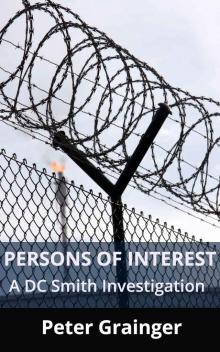 Persons of Interest
Persons of Interest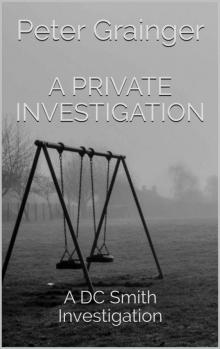 A Private Investigation
A Private Investigation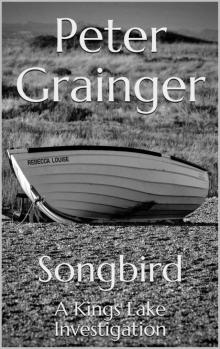 Songbird
Songbird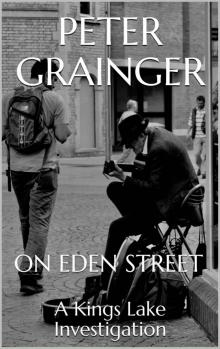 On Eden Street
On Eden Street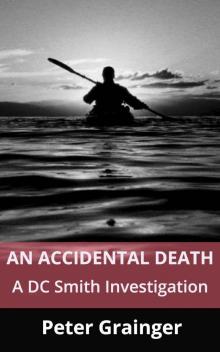 An Accidental Death
An Accidental Death Time and Tide
Time and Tide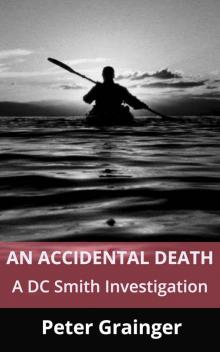 An Accidental Death: A DC Smith Investigation
An Accidental Death: A DC Smith Investigation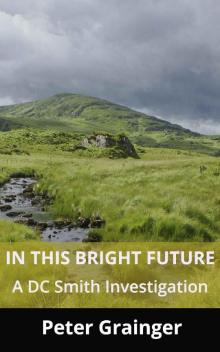 In This Bright Future
In This Bright Future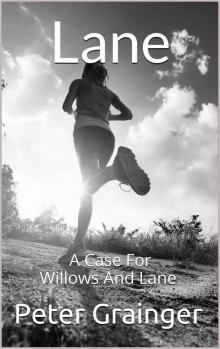 Lane: A Case For Willows And Lane
Lane: A Case For Willows And Lane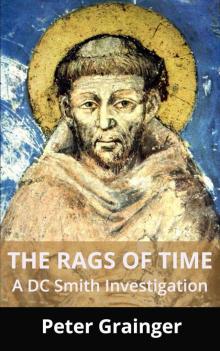 The Rags of Time: A DC Smith Investigation
The Rags of Time: A DC Smith Investigation Luck and Judgement
Luck and Judgement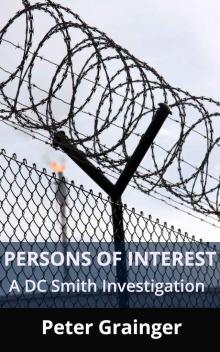 Persons of Interest: A DC Smith Investigation
Persons of Interest: A DC Smith Investigation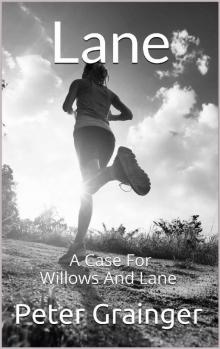 Lane
Lane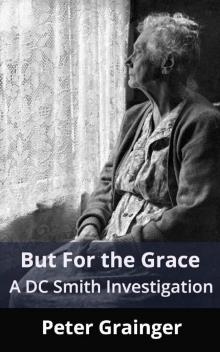 But For The Grace
But For The Grace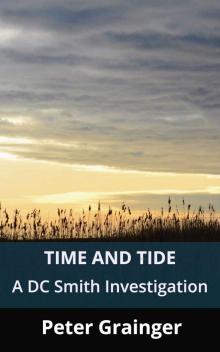 Time and Tide: A DC Smith Investigation
Time and Tide: A DC Smith Investigation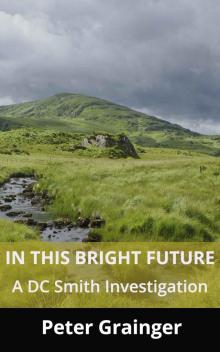 In This Bright Future: A DC Smith Investigation
In This Bright Future: A DC Smith Investigation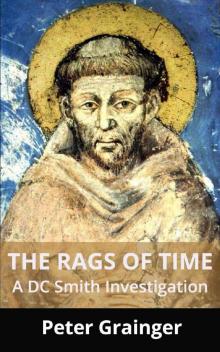 The Rags of Time
The Rags of Time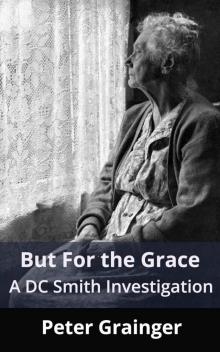 But For The Grace: A DC Smith Investigation
But For The Grace: A DC Smith Investigation Luck and Judgement: A DC Smith Investigation
Luck and Judgement: A DC Smith Investigation